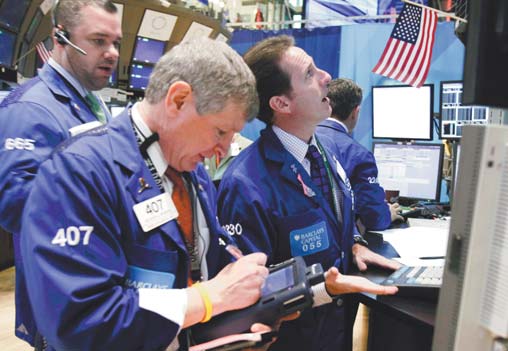US economic report, European debt crisis send stocks lower

Specialist Glenn Carell, right, works at his post on the floor of the New York Stock Exchange on Monday. The collapse of talks aimed at reducing the staggering U.S. budget deficit weighed on world markets Tuesday.
Associated Press
NEW YORK
A downward revision of U.S. economic growth in the third quarter sent stocks lower Tuesday. Higher borrowing costs for Spain also renewed worries about Europe’s debt crisis.
The Commerce Department reported that the U.S. economy grew at a 2 percent annual rate from July through September, down from its initial estimate of 2.5 percent. Economists had expected the figure to remain the same.
The Dow Jones industrial average lost 53.59 points, or 0.5 percent, to close at 11,493.72. Aluminum maker Alcoa Inc. led the Dow lower. The Dow had been down as many as 113 points shortly before noon.
The Dow plunged 249 points Monday as a congressional committee failed to reach a deal to cut budget deficits. The deadlock raised fears that rating agencies might lower the U.S. government’s credit rating if Congress tries to circumvent the automatic spending cuts that are supposed to occur in the event of an impasse. Some Republicans have said they would try to block cuts to defense spending.
“Markets are looking for clarity, and you didn’t get that from the supercommittee,” says Steven Ricchiuto, chief economist at Mizuho Securities. “There’s no reason to believe the economy is going to get stronger.”
Across the Atlantic, there were more signs of trouble in Europe’s debt crisis. Spain was forced to pay sharply higher interest rates in an auction of short-term debt. The higher rates suggest that investors still are skeptical that the country will get its budget under control despite a new, center-right government coming to power this week.
Investors have been worried that Spain could become the next country to need financial support from its European neighbors if its borrowing rates climb to unsustainable levels. Greece was forced to seek relief from its lenders after its long-term borrowing rates rose above 7 percent on the bond market. The rate on Spain’s own benchmark 10-year bond is dangerously close to that level, 6.58 percent.
The Standard & Poor’s 500 fell 4.94 points, or 0.4 percent, to 1,188.04. The Nasdaq composite fell 1.86, or 0.1 percent, to 2,521.28.
It was the fifth-straight decline for the S&P 500, the longest losing streak since August.
 43
43
